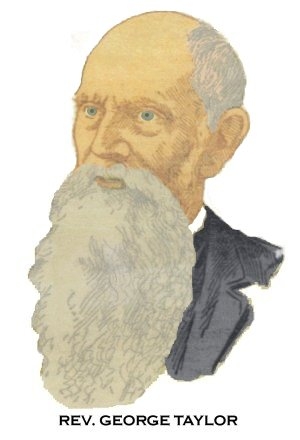
Rev. George Taylor was born in Mereworth, Kent Co., England about 1810, he was the son of a mechanic, and the fourth child of nine children. He attended the village schools, and at the age of twenty, became a licensed pastor in the Weslyan Methodist Church. Pastoring for two years, George became tired of the persecution he endured by the church, because of his liberal views on church doctrine, and decided to emigrate to America.

After coming to America George first settled in New York and soon afterwards moved to Rochester where he preached and was then assigned a pastorate in Pittsford, Victor, and Mendon. Staying in Mendon for one year, after which his health failed him and he had to give up his ministry for a time. After recovering from his illness he was sent to Perry where he stayed for seven years. In 1849 George moved to Michigan and after arriving in Detroit joined the Methodist conference, and in turn was sent to pastor at Saline, where he stayed for one year. And then to Ypsilanti where he stayed for two more years.
In the autumn of 1849, Rev. George Taylor became the pastor of the Methodist Episcopal Church on Congress Street in Detroit. In the following spring, during his pastorate, by way of introduction from Colonel J. B. Grayson, George made the acquaintance of Lieutenant Ulysses S. Grant. As a result, Lieutenant Grant rented a pew in the church and attended regularly during his stay in Detroit. Years later, when General Grant became President, he professed his esteem for his former pastor on more than one occasion.
In 1852 George was again assigned the old church on Congress Street in Detroit, which burned in 1855-56. He was then sent to Pontiac, Romeo and Flint, where he stayed for two years in each town, which was common practice to be moved every two years to another church. For awhile, he shared in the ministry of the second Methodist Episcopal church in Ann Arbor's fith ward before it disbanded in 1859. In 1862 George traveled to Howell, Pontiac, Ann Arbor, and Medford. At the outbreak of the Civil War Rev. George Taylor felt it was his duty to join the fight and enlisted in Company S, Eighth Michigan Infantry as a Chaplin, on October 9, 1962. Again Rev. Taylor's failing health caused him to resign his commission and on March 10, 1863 he left the infantry and returned to Ann Arbor where his family awaited him. He continued to preach in Ann Arbor and surrounding communities until the end of the war.
At the close of the Civil War there were efforts by people and organizations to raise funds for a soldiers monument, to be built in Detroit. Funds were slow in coming and so in 1868 Rev. George Taylor was summoned by John Owen and was appointed to raise funds for the project. This meant Rev. George Taylor had to get a leave of absence from his preaching duties, but he felt the monument was well worth the effort. Rev. George Taylor held lectures and collected money throughout the state, devoting most of his time to this tribute to the Valor of Michigan's war heros. The total amount raised during this time was $80,000, and this covered the total cost.
For a number of years after the monument was completed, Rev. Taylor continued to preach and in 1882, failing health and old age caused him to retire from his duties and active work. And about 1885 he went to live with his daughter Mrs. Virgil (Celia) Lozee in Detroit. Soon after this his son-in-law died and Rev. Taylor and his daughter moved to Lansing, where he lived until 1897. At eighty-seven years of age, Rev George Taylor quietly passed unto his maker whom he had served all his life. He was a devout Christian, and although he was not born in this country he did his duty and was as patriotic as anyone born here. Having only kind words to say, he was a thourough American. He was patient and lived a long life. He was a member of the Knights of Templar.
Rev. George taylor married Julia C. Banister (Benister)
The marriage produced these children: